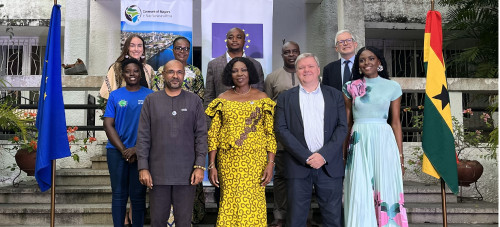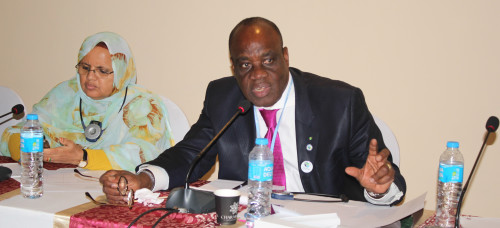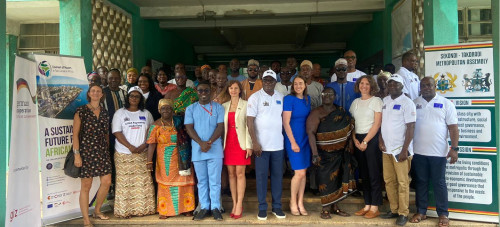Women political leaders and finance experts share strategies for financing gender responsive climate action
Published: 28 May 2021
In order to prioritise gender relevant climate actions, gender needs to be entrenched from early on in the planning process. Understanding the context and unique challenges women face is critical to plan for, develop and implement gender sensitive climate actions.
Globally, the impacts of climate change affect women and men differently, and evidence shows that women are disproportionately impacted by the detrimental effects of climate change – especially on the African continent. It is therefore imperative that climate finance decisions prioritise infrastructure projects that support and promote the upliftment and build the resilience of women in society.
The Covenant of Mayors in Sub-Saharan Africa hosted a session titled “Financing gender relevant climate action in African cities” in partnership with the Network of Locally Elected Women of Africa (REFELA) at RISE Africa Action Festival 2021. RISE Africa is a platform for change-makers, disruptors and advocates from across the African continent to drive innovation in their own unique and powerful way. Watch the full video, here.
The need for a context-based approach to bring women into the conversation
Honourable Mayor Macoura Dao, the Mayor of Foumbolo in Côte d’Ivoire and the President of REFELA emphasised the importance of understanding the context in which climate action must take place. This context is characterised by poverty, budget constraints and lack of access in many cases. There is an urgent need for women to champion the climate action agenda; one of the reasons REFELA was created was to assist in this process. REFELA collaborates with organisations that have similar objectives to create awareness around the need for gender mainstreaming in financial budgets and other policy decisions.
CoM SSA signatory, Honourable President Fatimetou Abdel Malick, of the Region of Nouakchott in Mauritania similarly highlighted the importance of a context-based approach saying that it is necessary to develop programmes that are adapted to the level of literacy of those most vulnerable to climate change impacts to ensure that we build capacity of these women and bring them into the conversation.
Strategies for directing climate funds towards gender relevant climate actions
Ms Tiffany Hodgson from the Green Climate Fund put the spotlight on requiring funding policies to include gender analyses and action plans to ensure that climate investments are gender sensitive. The Green Climate Fund has developed a gender policy to contribute towards reducing the gender gap through investing in projects that mainstream gender equality. Miss Hodgson suggested that local and national governments consider consulting gender experts in the early stages of climate change projects and policy design, in order to entrench gender from the start.
Institutions that play a critical role in unlocking climate finance need to ensure that gender mainstreaming is prevalent in projects. Ms Naïda Mohamed from the African Development Bank (AfDB) explained that the AfDB is working on several framing areas to ensure investments are gender and climate friendly. One of these areas is developing a system to mainstream gender in the corporation, using a gender marker system, this tool helps to differentiate organisations that design projects to ensure women/girls and men/boys will benefit equally. Miss Mohamed stressed the importance of data collection in ensuring better and more equal financial opportunities for women because they face a number of barriers to accessing resources.
Creditworthiness is a key barrier to cities and it is equally a challenge to women accessing finance and Ms Bianca Gichangi from the Eastern Africa Alliance on Carbon shared some strategies for how this can be improved, for example, flexible payment periods or a change in the collateral requirements.
Charting the way forward for gender mainstreaming
Mr Mohamed Nbou, Special Advisor to the Secretary General at UCLG Africa highlighted the importance of preparation to ensure the integration of gender issues in climate-focused projects. Mr Nbou mentioned the pivotal role governments play in addressing gender issues. The gender perspective must be dealt with head on; Mr Nbou noted a number of concrete mechanisms already exist through the GFC, the AfDB as well as the partnership between UCLGA and ICLEI Africa to move the integration of women forward.
Dr Meggan Spires, Climate Change, Energy and Resilience Director at ICLEI Africa explained that gender is a cornerstone of the CoM SSA programme, a European Union action. CoM SSA applies gender considerations to the actions of implementing partners and the CoM SSA Secretariat.
These actions include:
- Working with a gender expert to prepare a Sustainable Energy Access and Climate Action Plan Toolkit with explicit recommendations on how local governments can incorporate gender mainstreaming into their climate and energy planning.
- Developing studies and resources such as one that will be launched in June 2021, on gender and street lighting, which will provide detail on how to design implementation projects that are gender responsive.
- CoM SSA, through events such as this, is building their partnership with REFELA, to enhance the capacity of and to amplify the voice of female African leaders on regional and international platforms.





